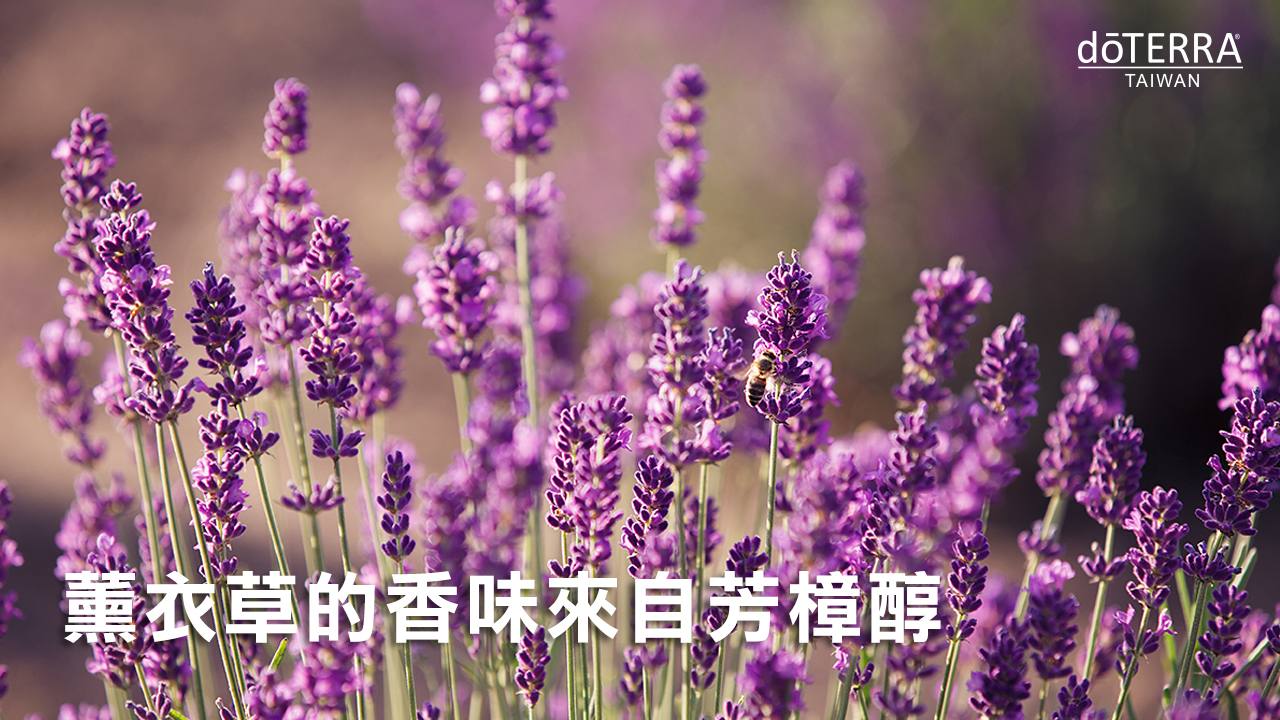薰衣草的香味來自芳樟醇

芳樟醇主要特點在於花香味,薰衣草的香味就是來自於此。
芳樟醇是一種自然產生的單萜醇 (含兩種易揮發不飽和元素:碳跟氫),許多花卉與香料中都含有大量芳樟醇,它大約佔了薰衣草組成的 30%,但在胡荽、胡荽葉、羅勒、苦橙葉精油的含量也很高。雖然它主要是因為香氣而被運用在商業上,但單獨來看,芳樟醇有許多特性是對健康有益的。芳樟醇經實驗發現有清潔的特性、能幫助安定情緒與放鬆,還能強化健康。
柑橘精油因含有高濃度單萜檸檬烯,通常被視為「清潔」精油,但實驗性研究指出芳樟醇也具備淨化特性(1,2)。如果你正在找尋方法改善自製清潔劑的洗滌能力或想增添新的清新香氣,試著加入幾滴薰衣草或胡荽葉精油吧!實驗性研究也指出,芳樟醇能幫助維持健康(3,4)。
薰衣草精油最廣為人知的功能為安定與放鬆,但富含芳樟醇的苦橙葉、胡荽以及其他精油也都有相似的效果。實驗性研究指出嗅吸芳樟醇香氣可以給人一種安穩放鬆的感受(5-7)。 如果要減緩負面的情緒,可以試試擴香羅勒的芬芳或每天早晨塗抹幾滴苦橙葉在頸後,除了能帶來獨有的個人香氣,還能紓解一天的疲勞。
精油各種有力的效用來自於它們的芳香化合物,嘗試幾款富含芳樟醇的精油,體驗它潔淨、安定以及強化身健康的效能。
【參考文獻】
- S. Tadtong, S. Suppawat, A. Tintawee, P. Saramas, S. Jareonvong, and T. Hongratanaworakit, “Antimicrobial activity of blended essential oil preparation,” Nat. Prod. Commun., vol. 7, no. 10, pp. 1401–1404, Oct. 2012.
- A. Herman, K. Tambor, and A. Herman, “Linalool Affects the Antimicrobial Efficacy of Essential Oils,” Curr. Microbiol., vol. 72, no. 2, pp. 165–172, Feb. 2016.
- A. T. Peana, P. S. D’Aquila, F. Panin, G. Serra, P. Pippia, and M. D. L. Moretti, “Anti-inflammatory activity of linalool and linalyl acetate constituents of essential oils,” Phytomedicine Int. J. Phytother. Phytopharm., vol. 9, no. 8, pp. 721–726, Dec. 2002.
- A. T. Peana, S. Marzocco, A. Popolo, and A. Pinto, “(-)-Linalool inhibits in vitro NO formation: Probable involvement in the antinociceptive activity of this monoterpene compound,” Life Sci., vol. 78, no. 7, pp. 719–723, Jan. 2006.
- M. Linck, A. L. da Silva, M. Figueiró, A. L. Piato, A. P. Herrmann, F. Dupont Birck, E. B. Caramão, D. S. Nunes, P. R. H. Moreno, and E. Elisabetsky, “Inhaled linalool-induced sedation in mice,” Phytomedicine Int. J. Phytother. Phytopharm., vol. 16, no. 4, pp. 303–307, Apr. 2009.
- T. Umezu, “Evaluation of the Effects of Plant-derived Essential Oils on Central Nervous System Function Using Discrete Shuttle-type Conditioned Avoidance Response in Mice: ESSENTIAL OILS AND AVOIDANCE RESPONSE,” Phytother. Res., vol. 26, no. 6, pp. 884–891, Jun. 2012.
- K. Kuroda, N. Inoue, Y. Ito, K. Kubota, A. Sugimoto, T. Kakuda, and T. Fushiki, “Sedative effects of the jasmine tea odor and (R)-(-)-linalool, one of its major odor components, on autonomic nerve activity and mood states,” Eur. J. Appl. Physiol., vol. 95, no. 2–3, pp. 107–114, Oct. 2005.
- E. Barocelli, F. Calcina, M. Chiavarini, M. Impicciatore, R. Bruni, A. Bianchi, and V. Ballabeni, “Antinociceptive and gastroprotective effects of inhaled and orally administered Lavandula hybrida Reverchon ‘Grosso’ essential oil,” Life Sci., vol. 76, no. 2, pp. 213–223, Nov. 2004.








